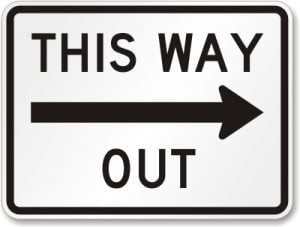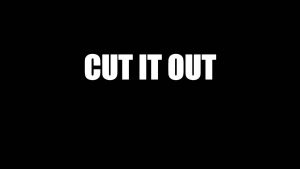In the June 7, 2016 Ask The Headhunter Newsletter, a job seeker expects more from employers.
Question
 When a company wants to interview me, I apply your advice and try to exert some control by asking that the hiring manager be present at my first interview. I think it’s inappropriate for an employer to ask me to invest hours of my time without that manager present. It worked recently with a small advertising company, and it actually helped the two-way respect, and I felt more confident talking about the role and compensation.
When a company wants to interview me, I apply your advice and try to exert some control by asking that the hiring manager be present at my first interview. I think it’s inappropriate for an employer to ask me to invest hours of my time without that manager present. It worked recently with a small advertising company, and it actually helped the two-way respect, and I felt more confident talking about the role and compensation.
But, what to do when it’s a large conglomerate, like an Apple or GE? I’m in the hiring process with two large companies (not those) and the process has been difficult and very drawn out. While I’m sure these companies have their reasons for doing it this way, it seems to be a waste of time. I guess you always have to be prepared to walk away. Any advice?
Nick’s Reply
Good for you for pressing to have the hiring manager in the interview when you can! I’m glad you’ve seen it will work to your advantage.
Even if the outcome is that the manager rejects you, at least it’ll be early in the process and you won’t have to waste more time, and at least the rejection will come from the person in charge of the job — not some personnel jockey who doesn’t understand you or the work.
At larger companies, the problem (as you note) is that the hiring process is more rigidly structured. It’s hard to get them to do anything different — like let you meet the manager immediately. While a company may have its reasons, it’s still disrespectful and a waste of time for the applicant to get assessed by someone other than the hiring manager.
And again, you’re right – you must decide whether to walk away.
Finesse the encounter
This is where judgment and finesse come into play. If you really want to work at a company, and there’s no getting around their system, you must decide whether it’s worth the risk you’re taking by complying with a process that isn’t to your advantage. But I don’t think it’s prudent to make a binary decision: Should I comply, or should I walk away? I think it’s a matter of degree:
- How much control should you concede to the employer?
- At what point do you draw a line?
- When do you walk away?
If you keep your wits about you, it’s also a matter of negotiation. It may be worth playing by some of their rules:
- How flexible are they?
- What concessions can you get in return for complying with parts of their process?
- What advantage can you gain?
- Perhaps most important, what can you learn from this initial give and take?
Collect some data
This is where getting recruited becomes fun. What should you ask for before you enter the lion’s den? You’re not required to attend an interview just because an employer asks. So collect some data points that will help you judge the employer!
- You’ve already taken one important step: Ask to have the hiring manager present. All they can do is say no.
- If the first interview will be with HR, ask when will the manager be involved? That is, when will you meet the manager? Get a commitment.
- What’s the hiring manager’s name? It will be to your advantage to look the manager up on LinkedIn prior to your meeting. (Or, Get the manager’s resume before you interview for the job.)
- What are the three main objectives of the interview? That is, what’s the employer looking for? (They likely can’t tell you, because hiring is haphazard in most companies.)
- What are the three key things they want a new hire to accomplish in the first six to twelve months on the job? (Again, they probably don’t know — but it’s worth asking and it’s to your advantage to know.)
- Get anything that helps you judge the employer and prepare for the first interview.
You might even go this far: Ask this question before you agree to an interview.
Judge the employer
As we’ve said, you’re not going to get all these concessions or information. But this preliminary negotiation is chock full of value. It’s partly to improve your chances in a job interview, but it’s also partly to test the employer. Yes — to test the employer. Some interviews are bad for you. Is this one of them?
- Do this employer know what it’s doing? (See What’s up with clueless interviewers?)
- Will they make some concessions to demonstrate respect to you — because they really want to interview you?
- Or, does it turn out you’re just a piece of meat – and they won’t compromise on anything at all?
Additional Resources
There are many ways to test employers, to push the boundaries, and to gather useful data before you invest time in lengthy interviews:
Fearless Job Hunting, Book 5, Get The Right Employer’s Full Attention:
- “How to pick worthy companies” — pp. 10-12
- “Is this a Mickey Mouse operation?” — pp. 13-15
- “Scuttlebutt: Get the truth about private companies” — pp. 22-24
Fearless Job Hunting, Book 8, Play Hardball With Employers:
- “Avoid Disaster: Check out the employer” — pp. 11-12
- “Due Diligence: Don’t take a job without it” — pp. 23-25
- “Judge the manager” — pp. 26-28
Every concession an employer agrees to or declines early in the process tells you something — it’s a useful data point or signal you can use to your advantage.
Is this “opportunity” really good for you?
When I “go along” because I want a gig (with a new client, for example), I never forget that I’m looking for compromises. If I’m the only one compromising, if I’m the only one who’s agreeable, then I’ll probably be taken advantage of in the end. So, I keep testing, I keep probing, I keep asking, and I keep track of whether and how the other party will bend for my benefit.
Give and take is all part of a good relationship, and you need to know as early as possible what the other guy is willing to do for you. If the employer tells you the application and interview process is “their way or the highway,” then hop the nearest bus.
I think you have it right: Be ready to walk away, but be prudent. Even big companies will sometimes flex when they encounter a candidate they are really interested in. If you haven’t inspired that kind of desire in an employer, then why bother with the process at all? Do you really want to be another beggar at the door?
Make reasonable requests to gain some advantage. And don’t stop too early. For everything they refuse, have another request – and see if they try to meet you somewhere in the middle. That’s the sign of a company that may be worth it, even if their process is clunky.
The reader follows up
Thanks for your response and advice. It’s definitely tough to know when to push boundaries at the biggest companies, but I really liked how you put it: At minimum, test the process a little and collect data points. This is the first time I’ve gone through the hiring process completely solo.
A big thing that I’ve learned is that every step and decision tells you something important about your relationship with that potential employer. It can be hard to understand what’s going on and to capture all the lessons as you move through the process, but your site has been really great in demonstrating how much strategy is involved at almost every step. It has really helped me be mindful of things I would have never considered. Keep it up!
Nick’s Reply
 Like my old mentor used to say, Use your judgment every step of the way, and do the best you can. And in the end, make choices — don’t let the other guy make them for you.
Like my old mentor used to say, Use your judgment every step of the way, and do the best you can. And in the end, make choices — don’t let the other guy make them for you.
One of my favorite quotes is from Henri Frederic Amiel:
“To be always ready, a man [or woman] must be able to cut a knot; for everything cannot be untied.”
It’s easy for people to get so caught up with “trying to win” at the interview game that they lose sight of the larger objective: to get a good job, the right job, working with good people in a good company, where future prospects are good. They’re so busy trying to satisfy the employer’s demands that they lose sight of their own needs. Then they get tied up in knots before they realize they’re in a bad situation.
Yes, be ready to walk away, but after you try to get your way, too. I admire your fortitude!
Do you know when to push back on the employment process? Or are you afraid you’ll anger the Interview Gods? What requirements do you make of the employer before you invest your time in interviews? If you just take any interview offered (Hey, I’m not ragging on you) — what problems have you encountered?
: :
Your column HR Managers: Do your job, or get out reminded me that most of what HR does makes no sense, and it’s not smart to bend to HR’s will when I’m looking for a job.


 Reader 1: Back in the 20th century, employers actually reviewed resumes by reading them rather than scanning them into a computerized ranking system. Keywords have turned hiring into a pass-the-buck game, with HR complaining it can’t find talent! Well, HR isn’t looking for talent. HR isn’t looking for anything. Phony algorithms are keeping the talent unemployed while HR gets paid to do something else! The question is, what is HR doing?
Reader 1: Back in the 20th century, employers actually reviewed resumes by reading them rather than scanning them into a computerized ranking system. Keywords have turned hiring into a pass-the-buck game, with HR complaining it can’t find talent! Well, HR isn’t looking for talent. HR isn’t looking for anything. Phony algorithms are keeping the talent unemployed while HR gets paid to do something else! The question is, what is HR doing? Budget problems may impact hiring and internal promotions, but it’s HR’s job to make sure all the i’s are dotted and the t’s are crossed before HR makes offers that impact people’s lives. Don’t make job offers if you don’t have the authority to follow through. If your company doesn’t give you that authority, then quit your job because you look like an idiot for having a job you’re not allowed to do. What happens to every job applicant is on you. (See
Budget problems may impact hiring and internal promotions, but it’s HR’s job to make sure all the i’s are dotted and the t’s are crossed before HR makes offers that impact people’s lives. Don’t make job offers if you don’t have the authority to follow through. If your company doesn’t give you that authority, then quit your job because you look like an idiot for having a job you’re not allowed to do. What happens to every job applicant is on you. (See  The job of recruiting is about identifying and enticing the right candidates for jobs at your company. It’s not about soliciting everyone who has an e-mail address, and then complaining your applicants are unqualified or unskilled. You can’t fish with a bucket.
The job of recruiting is about identifying and enticing the right candidates for jobs at your company. It’s not about soliciting everyone who has an e-mail address, and then complaining your applicants are unqualified or unskilled. You can’t fish with a bucket. I have a standing challenge to anyone in HR: Give me one good reason why you need to know how much money a job applicant is making. No HR worker has ever been able to explain it rationally.
I have a standing challenge to anyone in HR: Give me one good reason why you need to know how much money a job applicant is making. No HR worker has ever been able to explain it rationally. part of the workforce), there’s plenty of talent out there to fill the 5.6 million vacant jobs in America. (See
part of the workforce), there’s plenty of talent out there to fill the 5.6 million vacant jobs in America. (See  I can understand why companies want and need non-competes and NDAs, but I feel signing such contracts limits my future job opportunities; at least the ones that would pay me the most. So, I could refuse to sign, and they can refuse to hire me. If I want the job, it seems I’ve gotta bite the bullet. Perhaps I could sign the contract as “Darth Vader” and they won’t notice.
I can understand why companies want and need non-competes and NDAs, but I feel signing such contracts limits my future job opportunities; at least the ones that would pay me the most. So, I could refuse to sign, and they can refuse to hire me. If I want the job, it seems I’ve gotta bite the bullet. Perhaps I could sign the contract as “Darth Vader” and they won’t notice. Thanks for bringing up a subject that many people are embarrassed about.
Thanks for bringing up a subject that many people are embarrassed about. When a company wants to interview me, I apply your advice and try to exert some control by asking that the hiring manager be present at my first interview. I think it’s inappropriate for an employer to ask me to invest hours of my time without that manager present. It worked recently with a small advertising company, and it actually helped the two-way respect, and I felt more confident talking about the role and compensation.
When a company wants to interview me, I apply your advice and try to exert some control by asking that the hiring manager be present at my first interview. I think it’s inappropriate for an employer to ask me to invest hours of my time without that manager present. It worked recently with a small advertising company, and it actually helped the two-way respect, and I felt more confident talking about the role and compensation. Like my old mentor used to say, Use your judgment every step of the way, and do the best you can. And in the end, make choices — don’t let the other guy make them for you.
Like my old mentor used to say, Use your judgment every step of the way, and do the best you can. And in the end, make choices — don’t let the other guy make them for you. “If you are intelligent enough you will find that I’m everything you’re looking for and more. If you are not, then keep on looking…”
“If you are intelligent enough you will find that I’m everything you’re looking for and more. If you are not, then keep on looking…” The big problem is I started to be sexually harassed by a woman co-worker. (I am gay.) This became very uncomfortable. When I finally reached my temp agency, they told me to talk to the woman and tell her (nicely) to take it easy. When I spoke with her, she seemed okay, but then she sent me a very disturbing passive-aggressive e-mail. I forwarded that to my agency and to my on-site manager.
The big problem is I started to be sexually harassed by a woman co-worker. (I am gay.) This became very uncomfortable. When I finally reached my temp agency, they told me to talk to the woman and tell her (nicely) to take it easy. When I spoke with her, she seemed okay, but then she sent me a very disturbing passive-aggressive e-mail. I forwarded that to my agency and to my on-site manager. With the job market being more favorable to employers, they suggest that getting into the dialog too early can remove you from consideration quickly. While none of us wants to waste time going through the motions only to discover the salary may be too low, it may be more important to stay in the game as long as you can, getting them to like you. It gives you more of an opportunity to sell yourself, too.
With the job market being more favorable to employers, they suggest that getting into the dialog too early can remove you from consideration quickly. While none of us wants to waste time going through the motions only to discover the salary may be too low, it may be more important to stay in the game as long as you can, getting them to like you. It gives you more of an opportunity to sell yourself, too. If you think trying to be likeable and saying “I’m sure you’ll be fair” will help you “stay in the game” longer, you’re going to lose because the employer will take advantage of the fact that you invested all that time — and correctly surmise that you’re going to take whatever they offer you. This is one of the oldest psychological tricks used in negotiating — look up cognitive dissonance. People have a tendency to rationalize and accept lousy job offers because they’ve spent so many hours in interviews.
If you think trying to be likeable and saying “I’m sure you’ll be fair” will help you “stay in the game” longer, you’re going to lose because the employer will take advantage of the fact that you invested all that time — and correctly surmise that you’re going to take whatever they offer you. This is one of the oldest psychological tricks used in negotiating — look up cognitive dissonance. People have a tendency to rationalize and accept lousy job offers because they’ve spent so many hours in interviews. I recently got a very nice thank-you note from an applicant to whom I had sent a no-thank-you — that is, a rejection letter. She seemed surprised to hear from me. As a manager, it has always been my practice to reply to every applicant either by letter or e-mail. I’ve been criticized for the time it takes. However, I believe that if someone takes the time to express interest in your company, the least you can do is tell them “no, thank you” if you don’t want them.
I recently got a very nice thank-you note from an applicant to whom I had sent a no-thank-you — that is, a rejection letter. She seemed surprised to hear from me. As a manager, it has always been my practice to reply to every applicant either by letter or e-mail. I’ve been criticized for the time it takes. However, I believe that if someone takes the time to express interest in your company, the least you can do is tell them “no, thank you” if you don’t want them. It’s easy to be rude to a resume; but you can’t hire resumes. Top-notch workers in your field will not stand for rudeness. Talk to all the people you pissed off when you ignored their applications, and you will learn what rude is. Rude is awakening to find your company’s professional reputation has been trashed by good applicants who found out you’re not as good as they are. (See
It’s easy to be rude to a resume; but you can’t hire resumes. Top-notch workers in your field will not stand for rudeness. Talk to all the people you pissed off when you ignored their applications, and you will learn what rude is. Rude is awakening to find your company’s professional reputation has been trashed by good applicants who found out you’re not as good as they are. (See  I want to make a big career change into medical device sales, but it’s going to be tricky. My experience is in teaching, primarily English as a second language. I don’t expect to get a sales job to start, so I want to start out in sales support. I’ve done tons of research on the company I’ve chosen, its technology and products, and I’ve even talked to some of the company’s customers — doctors and medical centers. I know that their salespeople’s time is worth a little over $1,000 an hour, so good sales support is key to profitability.
I want to make a big career change into medical device sales, but it’s going to be tricky. My experience is in teaching, primarily English as a second language. I don’t expect to get a sales job to start, so I want to start out in sales support. I’ve done tons of research on the company I’ve chosen, its technology and products, and I’ve even talked to some of the company’s customers — doctors and medical centers. I know that their salespeople’s time is worth a little over $1,000 an hour, so good sales support is key to profitability.